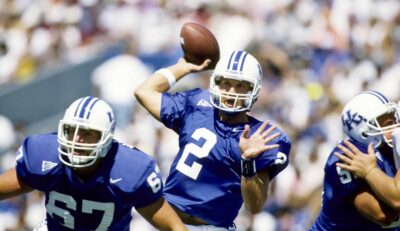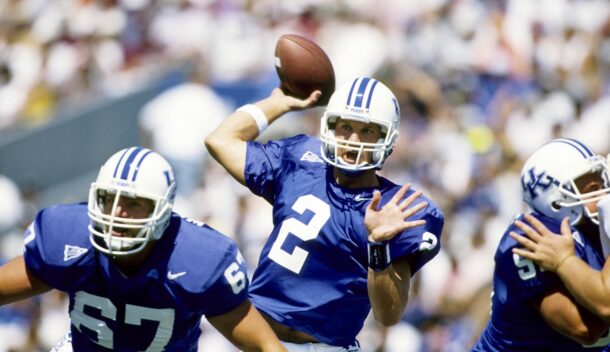Every spring you hear a host of names, both old and new, that coaches label as the “most improved” on a given team. Usually, it’s role players or backups ascending to the next level of play.
For instance, this spring at LSU, backup wide receiver D.J. Chark has been a star in practice. Defensive tackle Davon Godchaux, forced into a starting role as a freshman, has upped his game. So has rotation offensive lineman Andy Dodd.
You generally don’t hear superstars mentioned in those conversations, which makes offensive coordinator Cam Cameron’s comments on a certain running frightening for the rest of the SEC.
“You’d be hard-pressed to have me tell you anybody other than Leonard Fournette is the most-improved player on our offense,” said on ESPN radio in Baton Rouge last week.
Excuse me?
“I tell people that and their eyes kind of open up because he was probably our best player a year ago, but he is. He’s tremendously improved,” Cameron continued.
When Fournette arrived on campus as a freshman with Heisman hype, there were murmurs of disappointment early on. He beat up on lower-tier teams, but struggled against the Tigers early Power Five opponents. LSU’s offense struggled to hit its stride, as the running game couldn’t get on track and the quarterbacks struggled as a result.
So what could Fournette’s improvement mean for the team?
His ascension to dominance (assuming he gets there) is going to make life a lot easier for everyone around him, for starters. Early in the season last year, teams could pack in near the line of scrimmage to stuff LSU’s fledgling run game. Anthony Jennings and Brandon Harris weren’t ready to be big-time SEC quarterbacks last year, and they didn’t stand a chance even facing eight-man boxes.
If Harris has truly gone through “a transformation,” as Cameron said in that same interview, or if Jennings is “matured,” that leaves LSU with a much better chance of matriculating the ball through the air, especially given all of the talent at receiver. While expecting one of those quarterbacks to make the leap to elite-level quarterback play might be wishful thinking, getting them to average would be a major boost for the LSU offense.
That’s doubly true if Fournette picks up where he left off with LSU’s final two games of the season.
“Even with what he did in the bowl game and the A&M game, he came in to this spring just dialed in and focused on certain things he wanted to get better at and he’s done that,” Cameron said.
In those final two games, a bruising win against Texas A&M and a disappointing defensive meltdown against Notre Dame, Fournette went nuts to the tune of 444 yards of total offense (including his kick return duties), and he averaged more than 140 yards on the ground per game.
Was Cameron insinuating that’s what we should expect from Fournette? Do the math and the answer is…maybe. Cam has talked about getting the ball in Fournette’s hands 20 times per game in 2015. Let’s say Fournette is as improved as Cameron says he is. We’ll tack on, let’s say, a yard to his yards-per-carry average, putting him around 6.5 yards a pop, a little bit below what last year’s elite rushers across the nation averaged, names like Melvin Gordon, Duke Johnson and Ezekiel Elliott.
Averaging 6.5 yards on 20 carries a game comes out to 130 yards per game, again a few notches below the elite rushers nationally. It also adds up to a season better than 1,600 yards on the ground, a mark that would challenge LSU’s single-season record.
Of course, this is all speculation. LSU’s coaching staff said a lot of things last year, mostly about the quarterback situation, and many of them didn’t come to fruition. Fournette is the most talented player on this team, and one of the most talented weapons the Tigers have had in quite some time.
If Fournette is as improved as Cameron says he is, it would be silly to do anything but let the fate of the season rest in his hands.
A former freelance journalist from Philadelphia, Brett has made the trek down to SEC country to cover the greatest conference in college football.







